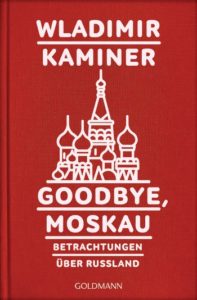Wladimir Kaminer left Moscow for Berlin in 1990, and since then he has lived and chronicled the life of a Russian in the German capital. In roughly two dozen books, beginning with Russendisko (Russian Disco, first published in 2000), he explores with droll humor what it’s like to make a new life in a changing country. Kaminer’s books vary their emphasis, but almost all of them are collections of short-ish stories that depict the comic interactions of his Russian and Soviet past, his partly German present, and all of the contradictions that arise from those elements.
Goodbye, Moskau bears the subtitle “Observations About Russia.” He takes a quotation from Gogol as his epigraph, “Oh, Russia, where are you rushing? Give me an answer!” Russia’s invasion and annexation of the Crimea in 2014 looms large over the book. Kaminer grew up in the Soviet Union, so he knows very well how the state can be cruel and foolish at one and the same time. But his childhood and youth were the waning years of the USSR, and in his earlier books, there is a greater sense of the old system’s absurdities, that it could stumble around like a blind fool, that it could be a nuisance or inconvenience, but that it wasn’t particularly malevolent.
In “Crimea,” the book’s second story, and old friend of Kaminer who always wondered what the Crimean beaches would be like if they weren’t jam packed with visitors decides to go and see what it’s like after the annexation. The friend still has a Russian passport, so travel to the peninsula won’t present a problem. “Two weeks later, however, Sergei came back, tanned and well rested.”
Crimea, he said, had made a spooky impression. Instead of looking toward the future, the people had looked back to the past, to the Soviet Union, but had landed in an un-time. They had tossed out the old Ukrainian money, but hadn’t yet received the Russian. In shops people used cucumbers instead of coins. The West was boycotting the peninsula, the beaches were empty of people, the water was clean and crystal clear for the first time in a hundred years. The confused locals ran around in Putin t-shirts. … They looked askance at Sergei, who wasn’t wearing any Putin. The radio constantly played old Soviet pioneer songs, and all over the buildings hung posters for a canceled Uriah Heep concert. (pp. 22–23)
Kaminer retains his humor, but this collection shows greater exasperation with the Putin-led state, its smallness, pettiness, emptiness. More than once he imagines Putin confronting his selection to be president of this unruly land and feeling overwhelmed, wondering “Why me?” Kaminer notes that Putin had few allies when called to the top, and that in the intervening years he has drawn on his former judo club and his neighbors from a summer-house settlement to join him in the corridors of power. “In the Kingdom of Labradors” distills Kaminer’s view of the personalization of power. Once upon a time, Putin had a Labrador named Conny, and Conny had three litters of puppies. Putin gave each puppy to one of Russia’s oligarchs, with instructions to take good care of the dog. Since then, each has been on a short leash, careful to do the president’s bidding, preferably even before being asked. The dog is happy, the president is happy, the oligarch stays in favor, and money and power support each other.
At the other end of his journey, he sketches integration into Berlin’s changing life. He mentions all the various nationalities who lived in the foreigners’ dorm where he first settled in the city, and the variety that inhabits his current building, where he lives with his wife and child. He notes that the people who had the easiest time adapting to life in a new country were those who had a constant interest that they pursued in their adopted surroundings. He mentions choristers and a dedicated sauna fan. Russian and German sauna customs are very different, but “in the sauna, where everyone sits naked on the same wooden benches, foreignness swiftly vanishes. The men of the sauna group soon took Valentin into their circle.” (p. 120) But integration is never complete. Several people Kaminer knows from post-Soviet countries wind up working in the fish department at Galeries Lafayette. The department has a French chef for two years; one of his signature dishes is a bouillabaisse, and he says that no one else in the department can make it taste properly French.
That sounded racist and [throwing away the recipe when he departs] was not a particularly friendly gesture, but fortunately the guys had long since learned the recipe by heart. Not for nothing had they stood next to the Frenchman for two years and made the bouillabaisse together with him. The fish soup thus stayed at the heart of the menu. But astonishingly it tasted differently each time, depending on which of the three students had just cooked it. If the man from the Altai mountains cooked the soup, it smelled like the Altai, like resin and honey. If it was the Moldovan, it smelled like old wine casks and hot paprika. The Georgian variant tasted of coriander and jasmine. The old Frenchman was right after all: his bouillabaisse couldn’t be imitated. Like a magic soup, it always tasted like the cook’s yearnings. Maybe that is the reason why my compatriots are even now sitting at the counter in the fish department of Galeries Lafayette and asking who’s doing the cooking. Always hoping, with the help of the French bouillabaisse, to still their homesickness. (pp. 144–45)
Kaminer’s anecdotes are always worth reading. In Goodbye, Moskau he is a bit sharper than usual. I take that as a measure of how at home he feels between his two worlds, and how much he would prefer a Russia that is not in thrall to Labradors and a judo club.

